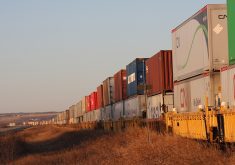A top executive at Canada’s largest grain handling and exporting company says the country’s grain supply chain has performed reasonably well despite challenges posed by the COVID-19 pandemic.
In an exclusive interview with The Western Producer April 17, Jean-Marc Ruest, senior vice-president of corporate affairs with Richardson International, said the Canadian grain industry has been working “pretty well” during the pandemic.
Foreign buyers of Canadian grains and oilseeds appreciate that the Canadian supply chain has continued to function and that individual exporters are continuing to meet their obligations in the international marketplace.
Read Also

Farming Smarter receives financial boost from Alberta government for potato research
Farming Smarter near Lethbridge got a boost to its research equipment, thanks to the Alberta government’s increase in funding for research associations.
“These are obviously interesting times,” Ruest said.
“We’re dealing with a lot of uncertainty. But to date, things on the Canadian side have been working pretty well.”
“We’ve got producers that are prepared to deliver grain. We’ve got facilities that are operating and are able to receive their grain. The railways are performing well and we’re able to load vessels (at
port). So for the time being, I think things are going relatively well, at least as well as could be expected.”
Ruest said Canada’s reputation as a reliable supplier of grains and oilseeds was tarnished in late 2019 and early 2020 following a rail strike and country-wide blockades that slowed grain movements and pushed export sales programs behind schedule.
The fact that the Canadian industry continues to honour its export obligations during the COVID-19 pandemic has not gone unnoticed by foreign buyers.
“I think on the international front, we’ve got customers that are very appreciative of the fact that we’re still able to perform, and I think that comes at a good time,” Ruest said.
“Our (Canada’s) reputation had been and is tarnished so being able to perform now (during the COVID-19 pandemic) I think is very important.”
“Our ability to continue meeting our obligations is very well received and hopefully we can keep that up.”
Around the world, COVID-19 chaos has caused significant disruptions to global food supply chains, with some grain-exporting nations imposing export restrictions and other countries considering similar measures to ensure domestic food security.
In contrast, Canada’s efforts to retain the flow of grain and oilseed exports suggests that concerns related to domestic food supplies here are relatively minor.
“The fact that we’re still committed to the supply chain and to the export programs we have versus
other jurisdictions that have either imposed or are considering imposing export restrictions — countries that we normally compete against in supplying international markets — I think is a sign that we have a little bit more confidence in … our own food security…,” Ruest said.
That’s not to say that there haven’t been challenges, particularly for export movements of containerized grain.
Canadian exporters who ship smaller volumes of grain, pulses and special crops are still struggling to meet extremely high foreign demand at a time when international movements of container shipping vessels has been significantly disrupted.
Greg Northey, a logistics expert with Pulse Canada, said the flow of containerized grain exports from Canada has improved considerably over the past few weeks, but uncertainty still persists.
In the past two months, the Port of Vancouver has experienced 40 blank sailings of container ships — where scheduled vessel arrivals are cancelled outright. Cancellations are primarily the result of low of North American demand for imported consumer products.
Blank sailings to Vancouver earlier this year caused a shortage of empty 20-foot containers on the West Coast. That, in turn, caused backlogs at container stuffing facilities that receive bulk commodities and transload them into containers for shipment overseas.
“That hit (Canadian exporters and transloaders) pretty hard in March,” Northey said.
“There’s been a bit better availability (of empty containers) recently … although it’s tough to say things are running at full capacity. There’s still a lot of work that needs to be done to try and maintain fluidity.”
West coast transload facilities were essentially plugged for much of March at a time when international demand for Canadian pulses and special crops was extremely high.
Container loading facilities are continuing to work through product backlogs and rail embargoes that were in place last week have since been lifted.
“Product is moving,” said Northey.
“The reports we’re getting is that product is moving to the transloaders. They (transloaders) are getting empties and containers are getting loaded onto ships right now….”
Northey said the pulse industry is watching international sailings of container ships closely. Container shipping alliances recently announced 64 additional blank sailings for Asian-North American routes through April, May and early June.
Not all of those blanks sailings would be expected to impact Vancouver, Northey said. But some almost certainly will, suggesting that disruptions in containerized grain movements through Canada’s West Coast “is probably going to be recurring and sustained” until North American demand for consumer goods returns to a more normal level.
“It will be an ebb and flow depending on what happens but the container trade in general is just really uncertain right now,” Northey said.
“The containerized shipping industry around the world has just seen a massive shock. When you shut down entire economies, it creates a problem.”
Although the bulk exports have fared comparatively well over the past month or so, Canadian exporters are assessing risks carefully.
When you look at our ability to keep doing what we’re doing “there are a number of threats to that at any given time,” Ruest said.
Among those threats is absenteeism — “people that stop coming to work and performing their duties, whether it’s employees of ours, of our suppliers or of our regulators,” he said.
“It’s a complex chain and if only one part of it stops … fulfilling its role in the chain, then we’ve got a problem all the way through, from the producer, to the grain companies, to the railways to the export terminals.”
“There’s a lot of moving parts in this and we need everybody to continue doing their part.
Contact brian.cross@producer.com


















